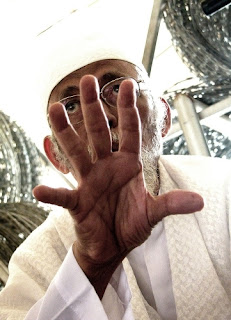 |
| Arief Kamaludin Rahmat |
 |
| Mohammad Revaldi |
 |
| Paul Kadarisman |
 |
| Mohammad Revaldi |
Frances Stern sent me a link to TAP, the Trans Asia Photography Review. While a quick viewing seems to reveal a more academic enterprise, I found one piece particularly interesting.
"Me and Mohammad" looks at three views of life within Indonesian Muslim society. They were taken in response to a question, what does it mean to live in the largest Muslim nation?
First, some background: Some years ago I worked on a PBS series for Maryland Public Television called Mini-Dragons, an international co-production of MPT, NHK Japanese Television and Film Australia. As Executive Editor I was responsible for helping shape the series and worked closely with the NHK team to guide their approach to storytelling. One of their programs focused on Indonesia. Back then I saw that country as exotic and I'd have to say somewhat mysterious. Perhaps my best sense of Indonesia was gleaned from the wonderful "Year of Living Dangerously."
Anyway, today I was struck by some of the images from this photo essay. And even more so by how hard it was to decode what I was seeing. Of course, these days we all see Muslims through a different lens (meaning events have propelled a more heightened awareness and sensitivity. Where some of us see victims, others see a potential threat, still others see people the same as you and me, just trying to live out their lives. Of course, Muslims are more varied than any of that. But it's a world, if you will, that remains unfamiliar at its core. Unfamiliar to me, anyway). Perhaps that's why I'd like to talk about the few photos I've included here.
The photo top left shows, I believe, an ex-leader of a radical Islamic group. I especially like the way his hand obscures his face, an emphatic gesture in this close up view that reveals a sense of power as it also prevents any chance for intimacy. So we witness a person at once revealed and hidden. We see power and mystery. Yet on closer look, his expression is without anger, seemingly making him centered more in the world of ideas rather than the world of raw emotion. Interesting juxtapositions.
The birthday cake is so "normal" it becomes surprising. Here, we're talking "normal" in terms of my own cultural expectations. But, thinking about it, why not? Everyone has a birthday and how nice to see it celebrated in a culturally familiar way. Unlike the first photo, it's easy to relate to this image. And, as the article explains, the focus of this photographer is upon people who are more economically privileged. So it's more likely they would embrace some customs imported from the West.
Then, bottom right, taken by the same photographer, we see a prayer before launching a Ramadan TV show. But here we encounter the worshippers in a studio of a pop singer, and close examination shows wall posters of Jimi Hendrix, Kiss, the Beatles, and the Rolling Stones among others. It's a little like the photo of the birthday cake. Different, yet familiar. And you could say a reminder of how much our culture has influenced others so far from our shores. And whether that influence is embraced by them or rejected, it still transforms. Maybe that's what speaks to me about all of these images: culture, and understanding, is ever evolving.
The fourth image is part of a photo series of the photographer's friends, all named Mohammad. To me they seem to be part of his own personal in-joke. Me and Mohammad means me and my pal Mohammad? Okay. But, again, the images are so westernized. What we see, really, is an image of two photographers, posing for a joint self-portrait. I can't go very far with this one, other than it has within it that youthful studied coolness coupled with a kind of bored informality. Some form of a slouch towards a visual version of "what ever."
So what's the overall vision? We all see the world through similar eyes. And we don't. There are meanings within that are lost to us because we're from different cultures. And yet, there is enough "there" there that I can use it to shed a little bit of light into another world. And find a moment to reflect and imagine all of what we know of the world that we all share.
No comments:
Post a Comment